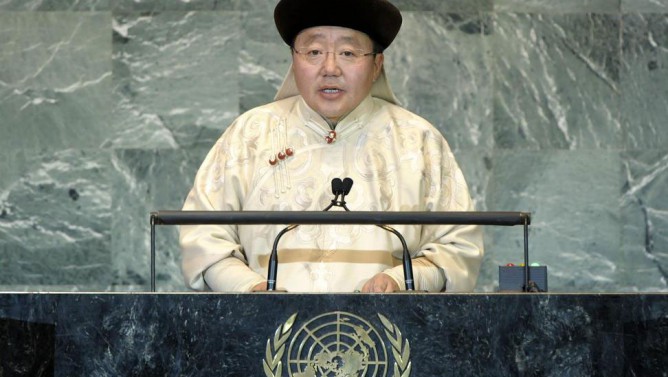21 September 2011 – Highlighting the special constraints faced by landlocked developing countries, the President of Mongolia today appealed to United Nations Member States to sign and ratify a multilateral agreement to set up an international think tank in his country’s capital to address the concerns of this vulnerable group.
The establishment of the think tank in Ulaanbaatar is “vitally important” to the world’s 31 landlocked developing countries (LLDCs), Elbegdorj Tsakhia said, addressing the high-level debate of the 66th session of the General Assembly.
The multilateral agreement for setting up the think tank is one of several treaties open for signature during the annual treaty event that coincides with the Assembly’s general debate. As of 19 August, one State had signed the agreement, which officially opened for signature on 1 November 2010.
Landlocked developing countries are generally among the poorest of the developing countries, with the weakest growth rates, and are typically heavily dependent on a limited number of commodities for their export earnings.
Mr. Tsakhia noted that remoteness from world markets and high transport costs are a major impediment to the development of LLDCs, and that establishing the think tank will “undoubtedly contribute to intensified cooperation” in the implementation of the Almaty Programme of Action.
Adopted at an international conference in 2003, the programme of action sets out specific measures regarding improved market access and trade facilitation to compensate LLDCs for their geographical handicaps.
The think tank will also contribute, said the President, to the efforts of LLDCs to achieve the Millennium Development Goals (MDGs) – the ambitious targets to slash poverty, hunger, preventable illness and a host of other socio-economic ills, all by 2015.
The distances involved in most cases of landlocked developing countries are excessive, according to the Office of the UN High Representative for the Least Developed Countries, Landlocked Developing Countries and Small Island Developing States (UN-OHRLLS).
Kazakhstan has the longest distance from the sea (3,750 kilometres), followed by Afghanistan, Chad, Niger, Zambia and Zimbabwe with distances from the nearest seacoast in excess of 2,000 kilometres.
Transit time for goods of LLDCs is extremely long because of their long distance, difficult terrain, road and railway conditions and inefficiency of transit transport.



